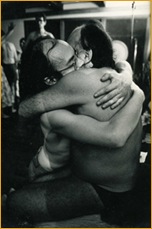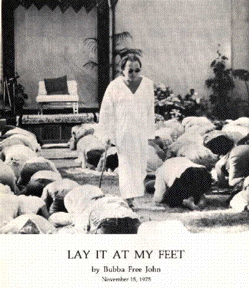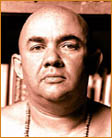"No Pity For Him!"
Through the Grace of Adi Da, I haven't experienced a moment of self-pity since December, 1992. This is the story of how that miracle occurred, and some insights
about the significance of that miracle.
In December, 1992, I returned to be with Adi Da on Adi Da Samrajashram (the island of Naitauba), after having been away for several months (since the time of Club Rat in July, 1992). My circumstance at the time (university professor, with summer breaks and breaks between semesters) enabled me to visit Naitauba frequently. And so, when at the end of my last retreat Adi Da said to me, "Come back soon!", I took Him at His Word. . . . . . which led Adi Da to make humorous remarks (which were passed along to me) when I arrived again on the island, a few months later: "When does that guy ever work?" and "He's going to beat River!" — referring to the number of visits to Naitauba by another devotee. (River was a longtime devotee who, like me, was in the fortunate position of being able to visit Adi Da frequently.) Not long after I arrived, Adi Da decided to have a gathering with all the devotees on the island, as part of His Celebration of Danavira Mela. Adi Da sat in a chair at the front of the large room in Hymns To Me, and would talk to all of us at times, and to individuals at other times.
At one point during the gathering, as I was sitting to one side of Adi Da's chair, quietly contemplating My Beloved Guru, I heard Him call out loudly (looking right at me), "Where is My Tongue?" (His name for me at the time.) "I've been waiting for his Danavira Mela kisses!"
And then I burst out weeping. There was no particular reason for it, any more than any other time someone bursts into tears after embracing someone they haven't seen for a while . . . a kind of emotional release. Adi Da held me tight as I wept. The other devotees in the room gathered in closer around Adi Da's chair. Then, even as He had His arms close about me, He spoke with great strength, making sure everyone around us heard Him: "No pity for him!" The room became silent. At the time, I took what Adi Da said to be His instructions to those around to not give me pity because I was weeping. It made sense. . . Here I was, in the arms of the Divine Person, and I was apparently doing a separative activity of "self-pity" or "poor me" — how absurd! And of course no one else should be supporting me in that. And since there were some devotees going "awww. . ." in response to my crying, it was natural for me to presume that Adi Da was speaking to them. So, understanding what He had just said in this way, I agreed with Him completely — and, for my part, I let go in that moment of the sorrowful, separative persona my Guru appeared to be reflecting to me. . . Little did I know (in that moment) what He fully meant! I had never particularly singled out "self-pity" as a character liability in myself, because I didn't engage in it any more or less than anyone else I knew. It was so "normal" that I never had paid it much attention. So in fact, several years went by before, in a flash, it suddenly dawned on me: I hadn't had a single moment of self-pity since that evening with Adi Da! He literally had meant: "No pity for him" — in other words: "From this moment on, I am relieving him of all self-pity." Not only did I not experience self-pity. I had also completely lost sympathy for a tendency (self-pity) that had previously been second nature, and which I had engaged automatically and frequently. I no longer had the slightest inclination to indulge in self-pity. It literally wasn't "me" anymore. This was an extraordinary miracle (whose full significance took me years to grasp), that took place in an instant in Adi Da's arms, not through any effort (or even prior understanding) on my part but through Grace alone — a miracle for which I am and will always be profoundly grateful to My Beloved Heart-Master. It is not the usual miracle we pray to God for: healing, relief from pain, an intimate partner, better material circumstances. But — as I have come to understand — it greatly serves the ultimate process of God-Realization, which is what the Way of Adidam is all about. (More about this in just a bit.) Lessons on Instantaneous Liberation From Karma Adi Da has always said that it is His intention, and a potential through His Grace, that we be freed from egoic patterning in the easiest, most benign manner — in a dream, in a moment of insight and Graceful release, etc. It can happen in any moment that we are fully cooperating with His Grace:
Adi Da has also cautioned that many patterns may not be "lifted off" in an instant in this miraculous manner. For those patterns, devotees instead have to go through the ordeal of disciplining their behavior (replacing egoic patterns with "right life" patterns), and having the egoic pattern gradually lose its force over time — however long that might take — through "non-use" and devotional resort to the Divine:
And so I still have many egoic patterns that I must discipline in this intentional, ongoing manner; the release from the karma of those patterns is equally Graceful and miraculous . . . just slower. But my sadhana has been greatly simplified by the miracle Adi Da performed in that moment. * * * From the beginning of His Work with devotees, Adi Da confirmed that He absorbed and dissolved the karmas of all who came into His Company:
The bliss that countless devotees experienced in His Company coincided with this release from karmas — release from the knot of self — that Adi Da was always spontaneously performing, as He meditated His devotees.[1] However, Adi Da also described how the release would only be temporary, because we would leave His Company and begin to "re-knot" ourselves. So those occasions were not merely a Transmission of Love-Bliss; they were also a release from (some significant degree of) egoic knotting, through karmic patterning. In any of those extraordinary occasions, if we could have matched Adi Da's dissolution of our karmas with self-understanding of all those karmas — enough to not re-engage them again — we could have been liberated to a significant degree (permanently freed from those karmas) in that very moment! The only way that temporary release from a karmic pattern would also represent permanent liberation from that pattern was if we also understood and lost sympathy with that pattern (or "bad habit"), and thus would not keep re-knotting ourselves (in that particular way). Thus, Adi Da's Gift to me had two parts: there was the release from the karma of self-pity in that moment; but — more importantly — there was understanding of, and loss of sympathy with, the pattern. It was that second part of His Gift — the Gift of self-understanding — that was the reason I was freed permanently from the pattern. That is why Adi Da talks about the potential for "karmas to pass in easy ways", but also stresses that "all the karma that must be seen, that must become your responsibility, can be shown to you easily":
Lessons on Self-Pity and the Cultures of Weakness and Strength It has taken many years for me to fully grasp the significance of Adi Da's Gift. The complete removal of self-pity (and along with it, almost all negativity) from my life has transformed me on many levels. When Adi Da was a student of Swami Rudrananda ("Rudi"), He said Rudi used to repeatedly stress the profoundly negative impact of self-pity on spiritual practice:
I mentioned earlier how at first I didn't even realize the significance of self-pity, negativity, and the like in my life (and its profoundly negative impact on my spiritual practice) because everyone has the same characteristics — in other words, it is a culture-wide blind spot. Released from self-pity, I came to have the space that allowed me to see the larger ramifications of self-pity, negativity, and self-imagery on not just me personally, but on a cultural scale. These character liabilities degrade the very value system of the culture, turning it into a culture of weakness, victimhood, and blame. We not only suffer self-pity, we presume it as the norm, and place no value on doing anything about it or outgrowing it. We reinforce it in each other, every time we "commiserate". And we do a huge amount of commiseration! Our "friendships" are often largely about commiseration, wherein much of our time together is spent taking turns dumping the problems of the day (or one's life altogether) on each other. (One meaning of "commiseration": being miserable together.) We become lifelong, "professional" victims, with narratives carefully constructed to describe the traumatic childhood experiences that justify our continued victimhood. (Such victim narratives are a major part of the "self-imagery" in Adi Da's "self-pity, negativity, and self-imagery" trifecta.) And this habit of chronic self-pity and "playing the victim" doesn't just stop with the past (and blaming our parents, etc.). Any time stress, challenge, or difficulty arises in the present, that same self-pitying character will tend to devote a significant portion of time and energy looking around for someone (or something) else to blame, rather than simply presuming the disposition of responsibility and devoting the entirety of one's energy and attention to addressing the challenge at hand. Adi Da once joked that our need to blame is so profound that we'll even "kick the end table" in the room, if there is no one and nothing else we can find to blame! Once we start presuming (and enacting) weakness on a regular basis (when we don't think we're up to actually dealing with our life problems), we then presume the need for consolation. So we take up habits of self-indulgence, aimed at providing that consolation, given the ongoing misery we feel when we just put up with all of life's problems (which are just too difficult for "poor me" to actually solve). So one more challenge of spiritual life in this "dark time" — this Kali Yoga — is that we are all programmed culturally and socially to take as the norm being weak-willed, self-indulgent, and double-minded (all terms Adi Da used regularly in characterizing the liabilities of His devotees that kept them from practicing effectively and "hearing" Him), given to much whining, kvetching, and commiseration. Spiritual practice is difficult enough! But add this contemporary pattern of weakness and self-indulgence, and a circumstance is created where everyone is "culturally programmed" out of the strength required to really grow. We not only talk ourselves out of that strength (through our self-pity, negativity, victim narratives, etc.) but everyone else we meet throughout the day tends to reinforce in us the same message of weakness, victimhood, and helplessness, through commiseration. In short: I do a "poor me" number, and they do a "poor you" number. And vice-versa. We are "enablers" of each others' addiction to weakness.
But this was not always the case! Many traditional cultures have a completely different value system — in contrast with our Western, self-indulgent, "TV and fast food" culture of immediate gratification, these were cultures of strength. Self-pity was not only not encouraged, but actively frowned upon. It was viewed as self-destructive and abusive to others. Instead of chronic negativity, an ongoing "can do" disposition was the norm. Instead of wasting most of one's energy in reactivity to problems (denial, fear, anger, sorrow, bargaining, depression, etc.), one moved to "acceptance" immediately, and invested one hundred percent of one's energy in addressing the challenge at hand. Members of such cultures kept their lives psychically simple by actually solving (as much as is possible) life challenges as they arose — rather than presuming weakness, avoiding dealing with the problems, and coping with the resulting misery by living a life of self-indulgence and distractions. Adolescents were not automatically granted the status of adulthood simply by reaching a certain age. Instead, they had to prove themselves ready through a time-honored, challenging, maturity-testing "rite of passage". Indeed, the traditional cultures to which Adi Da alludes when He uses the phrase, "the Ancient Walk-About Way", were in general not only ones in which spiritual sensitivity was cultivated (enabling the instant spiritual recognition of the Realizer). They also tended to be cultures of strength, of the sort I just described. And it was this combination of spiritual sensitivity and human maturity and strength that enabled their practice of "the Ancient Walk-About Way" to be fruitful — it enabled practitioners to commit themselves to both the Light and the Fire:
So I came to see that these characteristics of self-pity and negativity are not an inherent part of everyone's egoic patterning. They are particular characteristics — and added liabilities — of our time and place that make spiritual practice that much more difficult (impossible, really), and which must be observed and relinquished if one is to grow in practice. Here is just one example. Growth in the Way of Adidam necessarily requires one to steadily increase one's capacity to endure tapas, the heat of self-transcending practice. If that capacity does not increase with time, there will be no further growth. But someone who is unconsciously committed to indulging self-pity and weakness will never be willing to go beyond a certain (minimal) level of "heat" — and that will constitute a chronic limit on their practice until they understand and transcend the "poor me" that is resisting the heat (and ultimately, the Light). If we can't stand the heat, we will inevitably get out of the kitchen! So "poor me" is a self-fulfilling prophecy. One can never transcend oneself if one is convinced on some level (through chronic self-pity, negativity, and self-imagery) that one cannot actually do what is necessary to transcend that "self". Here's another example. "It's not fair" and I deserve better!" are common complaints in our culture of weakness. However, as Adi Da observes (in the guise of "The Laughing Mama"): "Your objections to any thing don't mean shit!" A related maxim from Him: "If you remember the worst is always yet to come, you will never be disappointed." All our notions of fairness and "what we deserve" are social constructs. They are not built into the "moral" fabric of the universe. The only "morality" built into the very fabric of the universe is the ongoing demand to transcend ourselves, and ultimately to Realize the Divine.
These notions of "fairness" and "what we deserve" only exist so long as we are members of a society that values "fairness" and that is able to enforce its own principles. Certainly trying to evolve a society that is increasingly more "fair" is a worthy enterprise. But the universe as a whole is not "fair". Indeed, if you think of everything the phrase, "an act of God", can refer to (from personal disasters like being struck by lightning, to collective disasters like massive earthquakes), you'll get a sense for just how much of the universe is not controlled by human society and its notions of "fairness". So a culture of strength must be able to practice beyond the "unjust" or "unfair" events that may occur in any moment, without complaint or reactivity. Even as He described the cultures that exemplified the Ancient Walk-About Way, Adi Da has always called Adidam to incarnate as just such a culture of both spiritual sensitivity and human strength and maturity. For this reason, He created many cultural instruments that support strength and growth in practice. The "devotional group" is one example. (When The Tiger Disappears is a wonderful talk where Adi Da focuses on this topic.) In an Adidam devotional group, the group members are either already intimate with each other, or allow themselves to grow in intimacy with each other over time. Intimacy is the basis for "baring one's soul" to each other; but intimacy is not an excuse for allowing endless dramatization, commiseration, or "case talk". As Adi Da demonstrated throughout His human life, love is best demonstrated by helping your friends transcend the causes of their suffering — rather than merely commiserating with them, but letting them continue to do what they are doing, and continue to suffer the consequences.
This is especially true in a context like a devotional group, where everyone (in principle) pre-agrees to that purpose for the group, upon becoming a member (even as one commits to the complete transcendence of egoity altogether in taking up the Way of Adidam). So the intimacy among devotional group participants is the basis for encouraging strength in each other, and holding each other accountable, based on one's love and compassion for each other — in the form of yamas (things to not do) and niyamas (things to do): "right life" disciplines for transcending "self", tailored to counter each individual's egoic patterning, and serving the magnification of that person's devotional practice. Taking on new disciplines each week in one's devotional group — and thus, systematically closing all the loopholes through which the ego is escaping — is a core part of what enables devotees to go through the hearing crisis (in a matter of months, Adi Da has suggested), and realize the fundamental self-understanding that is hearing, the first major milestone in the practice of the Way of Adidam.
That is the idea, at any rate! But our cultural blind spot can wreak havoc with this design. Because every member of the group was raised in our Western "culture of weakness", every group meeting may be unconsciously motivated to indulge in the weakness of endless commiseration and avoid Adi Da's actual, primary purpose for the group — actual, measurable growth in practice — reducing it instead to a social occasion; or a devotional occasion, but absent the intended focus on growth.
In a real sense, a "culture of strength" tool such as a devotional group is a kind of "alien transplant" in a culture of weakness. . . It is much easier for the culture of weakness to sabotage the devotional group, than it is for the devotional group to help transform a culture of weakness into one of strength. To close out this brief consideration of devotional groups, let me leave you with a different vision (using my words, but expressing Adi Da's Vision), that exemplifies the twin pillars of the Adidam culture as Adi Da envisioned it: inspiration and expectation. . .
This is actually what Adi Da envisioned when He created devotional groups!
* * * Strength reinforces strength and weakness reinforces weakness:
I can't guarantee that anyone reading this will be liberated from self-pity (and the weakness that follows from self-pity) in the instantaneous way I was, through Adi Da's Grace. But I can definitely say that transcending self-pity and weakness are essential to growth in the Way of Adidam, and Adi Da provides us with the means and the Grace to do this. And I can attest to this: living from the disposition of (ever-increasing) strength rather than weakness is a wonderful "place" from which to practice the Way and live life!
|
|||||||||||||||||||||||||||||||||||
| Quotations
from and/or photographs of Avatar Adi Da Samraj used by permission of the copyright
owner: © Copyrighted materials used with the permission of The Avataric Samrajya of Adidam Pty Ltd, as trustee for The Avataric Samrajya of Adidam. All rights reserved. None of these materials may be disseminated or otherwise used for any non-personal purpose without the prior agreement of the copyright owner. ADIDAM is a trademark of The Avataric Samrajya of Adidam Pty Ltd, as Trustee for the Avataric Samrajya of Adidam. Technical problems with our site? Let our webmaster know. |

 I leapt to my feet, ran to His chair, and threw my arms about
Him, and He did the same.
I leapt to my feet, ran to His chair, and threw my arms about
Him, and He did the same. If
your approach to me is wonderful and full of love and sacrifice,
as it should be, then all the karma that must be seen, that
must become your responsibility, can be shown to you easily.
I am willing for it to be shown to you in a dream or in just
a brief moment, some little circumstance that comes and goes.
I am perfectly willing for you to understand that dimension
that you must understand in yourself on just such an occasion.
I am willing for these karmas to pass in easy ways, in dreams
and simple circumstances. But if you approach is not whole,
not direct, not one of service, consciously lived all the
time, to the degree that you do not live such
If
your approach to me is wonderful and full of love and sacrifice,
as it should be, then all the karma that must be seen, that
must become your responsibility, can be shown to you easily.
I am willing for it to be shown to you in a dream or in just
a brief moment, some little circumstance that comes and goes.
I am perfectly willing for you to understand that dimension
that you must understand in yourself on just such an occasion.
I am willing for these karmas to pass in easy ways, in dreams
and simple circumstances. But if you approach is not whole,
not direct, not one of service, consciously lived all the
time, to the degree that you do not live such 